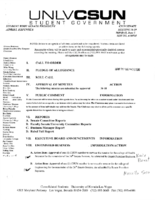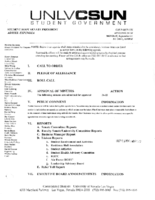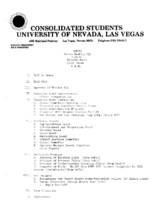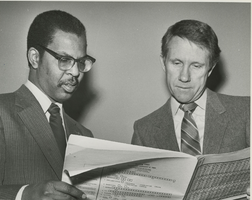Search the Special Collections and Archives Portal
Search Results
Alma Vining oral history interview
Identifier
Abstract
Oral history interview with Alma Vining conducted by Christine Carrera on April 10, 2006 for the Public School Principalship Oral History Project. In this interview, Vining reflects upon her 30-year career as an elementary school teacher and administrator with Nevada’s Clark County School District (CCSD) from the 1970s to the 2000s. She describes the process by which she became an administrator, her regular responsibilities, and challenges that she faced. She also discusses school district programs such as No Child Left Behind, bilingual education, and school integration.
Archival Collection

Meeting minutes for Consolidated Student Senate, University of Nevada, Las Vegas, June 05, 2006
Date
Archival Collection
Description
Text

Meeting minutes for Consolidated Student Senate, University of Nevada, Las Vegas, September 11, 2006
Date
Archival Collection
Description
Text

Transcript of interview with Brian Cram by Stefani Evans and Claytee White, October 28, 2016
Date
Archival Collection
Description
Throughout his career, former Clark County School District Superintendent (1989–2000) Brian Cram took his father's words to heart. He heard them repeatedly over the years as he watched and later, helped, his father clean classrooms at Robert E. Lake Elementary School: this place—the classroom—this is the most important place. Cram was born in Caliente, where his father worked on the railroad. In 1939, when Cram was a toddler, the family moved to Las Vegas and his father found work first as a sanitation engineer at a hospital, and then at CCSD as a custodian. The elder Cram, who spent his formative years in the Great Depression, prided himself on doing "good, honorable work" as a custodian, because the work—the classroom—mattered. Even so, he wanted more for his son. Cram largely ignored his father's advice during his four years at Las Vegas High School, where he ran with The Trimmers car club, wore a duck tail and a leather jacket, and copped an attitude. Cram's swagger, though, d
Text
Mabel Hoggard Papers
Identifier
Abstract
The Mabel Hoggard Papers (1903-2011) contain materials related to Hoggard's career as a Las Vegas, Nevada elementary school teacher, her research and civic interests in Las Vegas's predominantly African American Westside communities, and her engagement with civil rights issues. The collection also contains materials about Hoggard's life, including biographical newspaper articles about her childhood, education, work, and family. The collection includes lesson plans, scrapbooks, awards, correspondence, photographs, and physical objects such as a vinyl record and political pins. The bulk of the collection focuses on her life in Las Vegas from approximately 1946-1989.
Archival Collection

Transcript of interview with Lydia Berry by Kathy Zeller, February 22, 1979
Date
Archival Collection
Description
Text

Meeting minutes for Consolidated Student Senate, University of Nevada, Las Vegas, July 28, 1981
Date
Archival Collection
Description
Text

Meeting minutes for Consolidated Student Senate University of Nevada, Las Vegas, May 23, 1994
Date
Archival Collection
Description
Text

Photograph of Paul Meacham and Harry Reid, January 16, 1984
Date
Archival Collection
Description
Image
